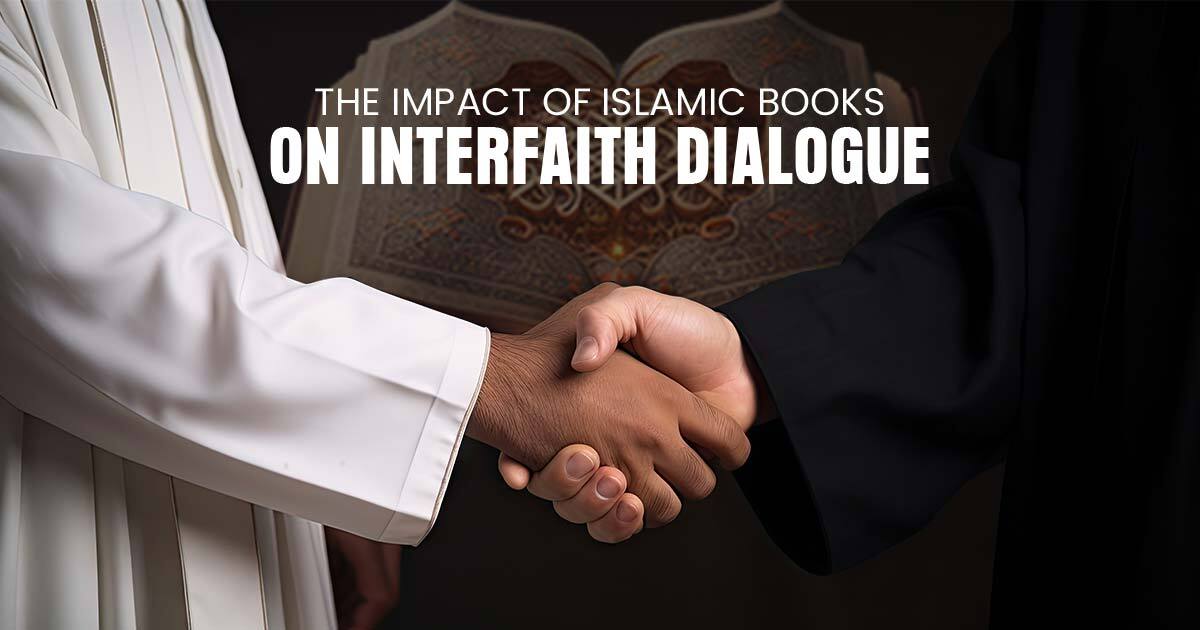In our increasingly interconnected world, fostering understanding between different faiths is crucial for promoting peace and social cohesion. Interfaith dialogue, the respectful exchange of ideas and beliefs between followers of various religions, plays a vital role in this endeavor. Islamic books, encompassing the Quran, hadiths (sayings and traditions of Prophet Muhammad), and scholarly works, offer a rich resource for interfaith dialogue. This blog explores the multifaceted impact of Islamic texts on interfaith understanding.
Common Ground: Universality in Islamic Teachings
Islam emphasizes the Abrahamic tradition, recognizing prophets like Abraham, Moses, and Jesus as figures of reverence. The Quran acknowledges the validity of previous scriptures, stating,”Qoolooo aamannaa billaahi wa maaa unzila ilainaa wa maaa unzila ilaaa Ibraaheema wa Ismaa’eela wa Ishaaqa wa Ya’qooba wal Asbaati wa maaootiya Moosa wa ‘Eesaa wa maaa ootiyan Nabiyyoona mir Rabbihim laa nufarriqoo baina ahadim minhum wa nahnu lahoo muslimoon”
“Say, ˹O believers,˺ “We believe in Allah and what has been revealed to us; and what was revealed to Abraham, Ishmael, Isaac, Jacob, and his descendants; and what was given to Moses, Jesus, and other prophets from their Lord. We make no distinction between any of them. And to Allah we all submit.'” (Quran 2:136).This shared heritage provides a foundation for interfaith dialogue, allowing participants to identify common values and ethical principles.
- Belief in One God: Islamic monotheism resonates with Judaism and Christianity, facilitating discussions on the nature of God, divine attributes, and humanity’s place in creation.
- Prophethood: The Quran’s affirmation of previous prophets fosters respect for diverse religious traditions and encourages dialogue on the concept of prophethood and its role in human guidance.
- Moral Values: Islamic teachings on justice, compassion, charity, and family life find parallels in other faiths, providing a common ground for discussions on social ethics and building a better world.
Understanding Islam: Dispelling Misconceptions
Islamic texts offer valuable tools for dispelling misconceptions about Islam. Through a close examination of the Quran and hadiths, followers of other faiths can gain a deeper understanding of Islamic beliefs and practices.
- Quranic Emphasis on Peace: The Quran repeatedly emphasizes peace and coexistence. For instance, the verse states: “And fight in the way of Allah those who fight you but do not transgress. Indeed, Allah does not like transgressors.” (Quran 2:190). This verse clarifies the concept of justified fighting in self-defense and discourages aggression.
- Hadiths on Respect: Numerous hadiths emphasize respect for people of the Book (Jews and Christians). For example, Prophet Muhammad (PBUH) instructed Muslims, “Whoever harms a dhimmi (protected person of a different religion) has harmed me, and whoever harms me has harmed Allah.” (Musnad Ahmad)
- Historical Context: Examining the historical context of Islamic texts allows for a nuanced understanding of verses that may be misinterpreted in a modern context.
Promoting Dialogue: Tools and Resources
Islamic books provide valuable tools and resources for engaging in productive interfaith dialogue.
- Quranic Verses on Interfaith Relations: Many Quranic verses offer guidance on interacting with people of other faiths. For instance, the Quran advises Muslims to “argue with them in a way that is best” (Quran 29:46) and to “invite [people] to the path of your Lord with wisdom and gracious advice” (Quran 16:125). These verses encourage respectful and constructive dialogue.
- Thematic Studies: Islamic texts offer a wealth of themes relevant to interfaith discussions, such as social justice, environmental stewardship, and interfaith cooperation. Studying these themes comparatively can foster understanding and collaboration.
- Scholarly Works: Islamic scholarship offers a vast repository of knowledge on interfaith relations. Studying the works of prominent Muslim scholars on interfaith dialogue can equip participants with valuable insights and arguments for productive conversations.
Challenges and Considerations:
Engaging in interfaith dialogue using Islamic texts also presents some challenges and considerations.
- Diversity of Interpretations: The Quran allows for some degree of interpretation. While core Islamic beliefs are clear, differences in interpretation can lead to disagreements. Openness to diverse perspectives is crucial in interfaith dialogue.
- Selective Quotation: Misusing or taking Islamic texts out of context can create misunderstandings. Contextualization and a focus on the spirit rather than the letter of the text are essential for productive dialogue.
- Respectful Communication: Interfaith dialogue requires mutual respect and sensitivity. Participants from various faiths should be mindful of language and avoid making generalizations or inflammatory statements.
Conclusion:
In a world yearning for connection, Islamic texts offer a powerful tool for interfaith dialogue. By highlighting shared values, dispelling misconceptions, and fostering respectful communication, these texts can bridge divides and promote understanding between faiths. Engaging with Islamic scriptures allows participants to appreciate the richness of religious traditions and identify common ground for cooperation. Ultimately, Islamic books can play a vital role in building a more peaceful and harmonious world.
FAQs About The Impact of Islamic Books on Interfaith Dialogue:
Can non-Muslims read the Quran for interfaith dialogue?
Absolutely! Translations of the Quran are widely available and can be a valuable resource for non-Muslims seeking to understand Islam better. It’s recommended to choose a reputable translation with annotations to provide context and facilitate comprehension.
Are there Islamic books specifically written for interfaith dialogue?
Yes, there are numerous Islamic books dedicated to interfaith dialogue. These books often explore commonalities between Islam and other faiths, address misconceptions, and offer guidance for respectful communication.
What are some good resources for learning more about Islamic texts in the context of interfaith dialogue?
Several resources can be helpful. Online resources from reputable Islamic institutions can provide insights. Additionally, university libraries or Islamic centers may have collections of scholarly works on interfaith dialogue.
How can I ensure a productive dialogue?
To ensure a productive dialogue using Islamic texts, focus on shared values like belief in God and morality. Actively listen to your partner’s perspective with respect, avoiding interruptions and clarifying questions. Maintain respectful communication with kind language, avoiding generalizations and cultural insensitivity.
What are the benefits of using Islamic texts?
Islamic texts offer a deeper understanding of Islamic beliefs and practices. They can promote respect for the diverse richness of religious traditions. Additionally, these texts can help identify common ground for cooperation on shared concerns.



